My journey toward understanding racism in Portland and the impact my whiteness has had on myself and others has taken a big turn in the past few weeks. This is because I finally took the time to listen to It Did Happen Here, an excellent podcast I highly recommend.
Hosted and co-produced by Mic Crenshaw and Celina Flores along with Executive Producer Erin Yanke in partnership with KBOO-FM, this podcast has opened my eyes to a chapter in Portland’s history that I’m ashamed to have not previously known more about.
It Did Happen Here exposes the jarring underbelly of Portland years before neighborhood gentrification and the “Portlandia” image took over. It tells the story of the rise in white supremacist and neo-Nazi groups — and how a dedicated group of anti-racists and anti-facists stepped up to push them out of town. The episode on the brutal beating and killing of 28-year-old Ethiopian Mulugeta Seraw in 1988 on the corner of Southeast 31st and Pine by three young white racists was especially eye-opening. I also love the parts where organizers and activists share their experiences, thoughts and methods for countering racists.
Advertisement
Here’s more about the show from the official website:
Skinheads had always been part of the local punk scene. In the late 1980s, punks and skins started being recruited by national white supremacist organizations, and that organizing work took off.
Portland became known as skin city. Racist skinheads roamed Portland , in groups, looking for victims and fights. Late one night in 1988 a group of Ethiopian friends were attacked in front of their apartment building in Southeast Portland. Mulugeta Seraw, a twenty eight year old Portland state student, was beaten with a baseball bat and left for dead. Their attackers were skinheads, members of East Side White Pride, a Neo-nazi street gang.
Following this, disparate groups in Portland came together to organize against this white supremacist threat. Activists started to work with anti-racist skinheads and politicized punks to confront and fight Neo-nazis in the streets and at punk shows.
By the mid 1990s neo-nazi skinheads had disappeared from the streets of Portland.
Advertisement
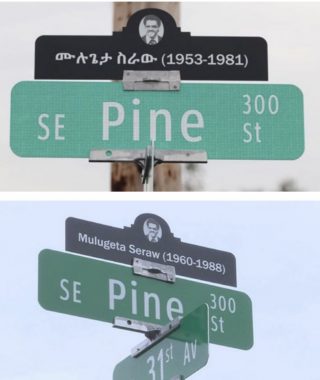
I thought I understood Portland’s recent history around racism well enough. I’ve read about the history of the Albina neighborhood and Williams Avenue; and I’ve thought a lot about the flooding of Vanport. But I had no idea how prominent racist skinheads were in Portland just 10-15 years before I moved here. I’ve had my head too singularly focused on cycling and transportation.
This stuff matters to everyone involved with bike planning and transportation policy in Portland. This recent racist history has led to an entire generation (and beyond) of Portlanders who are rightfully fearful of being vulnerable in the public right-of-way (in episode three community organizer and racial justice scholar Scot Nakagawa talks about how he was run off the road by neo-Nazis while riding his bike). This podcast has also made it even clearer to me why some Black, indigenous and people of color in Portland harbor distrust, skepticism, and even anger at white people in positions of power who come into situations without the proper amount of humility, respect, and understanding of racial context.
And there are direct connections to today: One of the men convicted in the murder of Mulugeta Seraw, Kyle Brewster, was seen fighting with counter-protestors at the capitol in Salem on January 6th.
As I learn more about this important part of Portland’s not-so-distant past, I’m surprised people in the transportation advocacy/cycling scene don’t talk more about it. No one ever shared this history with me, so I plan to weave it into my work and perspectives going forward to make sure it’s not forgotten. As a white person with a platform in this community, talking and writing about racism is challenging — but it must happen. If we want to change how people feel when they move around streets, we must embrace this dark past when people were terrorized for walking, biking, or simply existing outside their homes, and understand that constant vigilance against white supremacy in all its forms is necessary.
It Did Happen Here launched in November and the latest episode was released this past Friday (January 15th). It’s available on all major podcast platforms and the official site has detailed (and very helpful) show notes.
— Jonathan Maus: (503) 706-8804, @jonathan_maus on Twitter and jonathan@bikeportland.org
— Get our headlines delivered to your inbox.
— Support this independent community media outlet with a one-time contribution or monthly subscription.

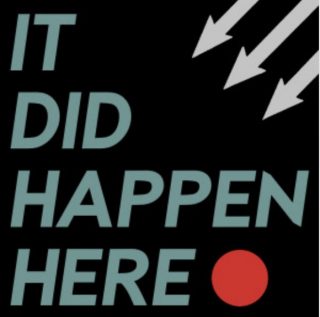
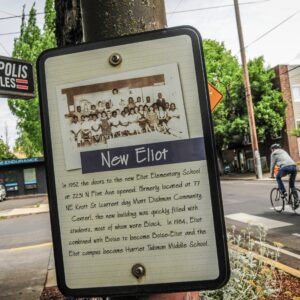
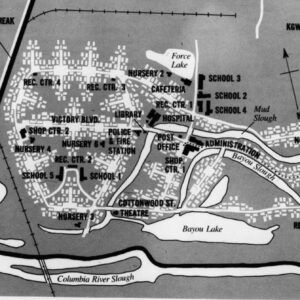
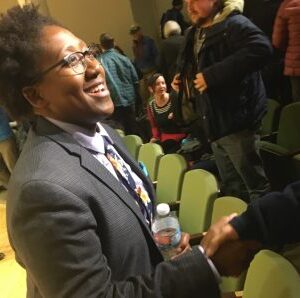
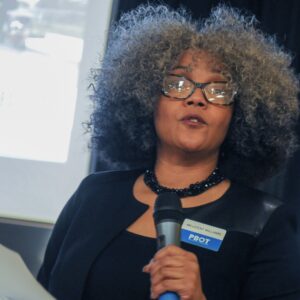
Thanks for putting this podcast on our radar. I spent my teenage years in the 80’s and 90’s around Portland’s punk scene, and knew to watch myself as a young gay and Latinx kid. Those people were malevolent and wouldn’t hesitate to hurt you.
Yes, the era of the crack cocaine epidemic with federal government and local police complicity. And the “don’t choke ’em, smoke ’em” murder of an innocent black security guard by cops, who got away with it.
Thank you for writing this, Jonathan. I wanted to recommend to BP readers a panel discussion hosted by my neighborhood association, Portland, the Black Experience: Neighborhood Reflections. The panelists were Mingus Mapps, Martha Jembere and Kevin Rhea.
Martha told a story which was difficult to hear. While she was a college student in Corvallis, she and a Chinese friend were chased by a group of men in Ku Klux Klan robes, at 2:00 AM as they returned to their dorm from studying. What is haunting is the terror in Martha’s voice as she recounts the attack. She’s still living it, and she says it changed her life. Martha’s not that old, this is something that happened within the last couple of decades.
I can’t link to it or my post disappears, but if you go to the Southwest Hills Residential League (SWHRL) web site there are links to the youtube video and to a newspaper article about the event.
I cannot think of any community in the USA (nor Canada for that matter) that doesn’t both have a long history of racism and more recent incidents. Every community I’ve lived in has had very prominent incidents and histories of systematic racism, usually against African-Americans, but also against Asians, Mediterranean peoples, Jews, American Indians, Metis (especially in Canada), and especially against people with two or more races, as well as against various foreign immigrants and refugees including white Europeans – basically anyone who isn’t one of us.
Anyone who wants to learn about these histories usually needs only to go to their local history museum, public library or talk with some older community members, but what I find remarkable is how few people actually do so, including and especially community advocates and members of the free press.
JM, I’m glad your now learning about Portland’s bad past, but it was never hidden – you just simply forgot to ask. For many others, they just don’t want to know.
To be clear David, I’m well aware of Portland’s “bad past” and local racist history… this post is just about learning of a very specific few years that for some reason doesn’t get talked about as much as others.
It wasn’t long after I moved to Portland in the late 1980s that I learned about much of the sordid history of Portland. Whether via articles in newspapers or local TV. Of course I’m a history nut so that helped.
So yes, it is readily available for those that have an interest.
Most will just slap a BLM sign in their front yard and call it good.
I remember this atrocity.
Why is Brewster out of prison?
Soft sentences for white people?
Well, maybe, but not exactly. I clicked through the link provided to the WWeek article, and learned that Brewster was convicted of first degree manslaughter, and served time until 2002 (and then went back in for parole violations). Another person, the one swinging the bat, was convicted of murder and hence hasn’t been able to attend any Trump rallies with his friends.
And, kind of like today, the PPB all but totally ignored this racial violence. Goes right along with their actual involvement as enforces for the Big Jim Elkins mob 30 years earlier.
Thanks for writing about this important history on such an important day – the same day that the trolling T**** administration released the report of their 1776 commission (https://en.wikipedia.org/wiki/1776_Commission), which basically white-washes U.S. history. Everybody should be aware of these efforts.
And thank you for pointing that out, Fred. I follow the news reasonably closely and I guess that will be in HCR’s Substack daily summary tonight, but that’s the first I saw of it. Sheesh, gaslighters.
We shouldn’t whitewash, blackwash, etc history. As we can see by the varying narratives surrounding current events, there are many takes on historical facts. Rather than dismiss the ones we don’t like, how about seeking empirical facts then listen to the perspective of the lived experience and try to discern the truth. Life is complicated and we shouldn’t be so reductive about it.
https://quillette.com/2020/02/17/sorry-new-york-times-but-america-began-in-1776/
The ‘progressive’ media always wants to generalize a few terrible events’ impact on a greater population. Just as a Black murderer’s crime against a white person does not turn all white people into racists or terrified of black people, or a few bad cops behavior against a black youth does not turn all black people into cop haters, Seraw’s murder did not make all black people fearful in the public right of way. It is these kinds of leaps in logic and facts that make the racial conversation almost impossible. At least, when it is carried on in the media landscape.
I think if you surveyed black Portlanders in the years following Seraw’s murder, you’d have found that fear pretty pervasive and persistent. I’m not sure what point you’re trying to make exactly. Is it simply to downplay the lasting impact of this very traumatic event? If so, why?
I think my point was pretty obvious, but I will restate it for you. Not all, or even most, members of a large group respond to a traumatic event in the same fashion. In fact, in some cases, most do not respond at all. Yes, a survey might be enlightening, but I think it is self-evident. The media, by assuming it is true, unfairly make assumptions about identifiable populations, and also unfairly guide the debate. Just as I don’t brand all black people when I read about the brutal murder of a white person by a black person, I also doubt most black people do the same in reverse. We read constantly about the fears of black people around white people, but never the reverse. Why is that? Because the media does not play it up.
Steve you appear to be stretching to reach a conclusion about this that fits your preconceived internal narrative and bias but that doesn’t exist in reality. Nowhere in my story did I make a statement that “all Black people” share any feeling of any kind. I go to great lengths to never generalize an entire group of people because I believe everyone is an individual with unique beliefs and that generalizing is an early step to stereotyping which is a big step toward hatred, racism, bigotry, etc…
And just so you know, I’m all for having this racial conversation! And I acknowledge it is often difficult to have… even feels impossible sometimes. But here we are trying and doing our best to muddle through. Thanks for your comment.
First of all, I did not say that you said anything about ‘all black people’. That was my own quote about my feelings. You need to read my comment more carefully. You did use the terminology ‘an entire generation’. That, in my mind, is an overly broad generalization.
ok fair points. Thanks.
I don’t think that’s overly broad at all. I took that statement as a reference to the trauma carried by a generation of Black Portlanders who lived through and remember the dangerous and scary period in Portland’s history that included, but was not limited to, the murder of Mulugeta Seraw. Sounds to me like it would’ve been a pretty universally unnerving time and place for anyone who wasn’t white.
To be clear I’m not saying I agree with Steve’s response to me… just that his points are being heard and made in a respectable way so I wanted to acknowledge that.
Damn, I thought you were agreeing with me. Not really. Respectful haha
So, do you think all black Portlanders from the 80’s/90’s felt this way. I know a few that would laugh at the notion (they did when I asked them:) if they had trauma from that time period.
Alternatively, I grew up in inner city as white minority and got harassed and beat up all the time by blacks and Mexicans. But I also had black and Mexican friends. I understood from a young age that the ones who were mean (racist?) had some pain in their life, their color didn’t make them bad. Feel pretty confident, most BIPOC get that to re:whites, but Kendi et al has and agenda and $ to be made, so though throw fuel on the fire and say it can never be quenched.
I have maybe 10 black friends/acquaintances, none of whom expressed feelings of trauma from racism to me. I’m sure they had their stories of course. When I think about it, they were not a good sample. Even my college roommate was an emmigrant from South America, several others were emmigrants, but all were middle class, and none grew up in an American inner city. I’m sure where you grew up had a lot to do with your experience of overt racism.
It seems to me that the “trauma” (over everything frankly) carried by today’s generation is far greater than that of any black Portlanders back then.
I’m genuinely confused by your comments, Steve. You made your first comment as a response to this blog post, and in that comment you raised the subject of “progressive” media making a specific generalization. Then when JM suggested his post didn’t fit your generalization of such media, you suddenly got much more precise to point out that you didn’t say he made that generalization…but that he apparently made “an overly broad generalization” different from the first you suggested?
What I mean is, your first post either was in response to content not existing in this blog post, and thus I’d wonder why you thought such content needed consideration here, or you were disingenuous in saying you didn’t see that initially suggested generalization in this post’s content. Which is it?
Regardless, I get wanting to fight any generalization, but just as you suggest anybody can resist generalizing people of other colors, I believe anybody reading a phrase like “an entire generation” can recognize that’s a shortcut to “an unknowable amount, both in quantity and distribution, of an entire generation”, and avoid reading the first phrase as literally suggesting every single person in the generation (and let’s keep in mind that generations are vague generalizations themselves) experienced the same thoughts, feelings, whatever.
Aside from that, one of your questions and the statements surrounding it reminded me of my youth consuming media: “We read constantly about the fears of black people around white people, but never the reverse. Why is that? Because the media does not play it up.”
That doesn’t square with what I remember. Entertainment history, for example, features many tropes of white people fearing black people. For instance, the all too common intimidating black person, often with a hoody and a swagger, causing decent and scared white people to cross the street and clutch their valuables tighter.
I recognize you may have just meant news media, though, so the above is mostly for my own musing sake.
Man, what a bad takeaway from a very important topic. White racist terror and it’s effect on our community is real and not a figment of media reporting. You through up a whole bunch of words on here, just to say “I like screwdriver”. “We read constantly about the fears of black people around white people, but never the reverse.” You’ve got to be kidding? White fear is accommodated, enlivened, and celebrated at almost every level of our society.
Evidence? You sound like Biden as he whips demand for domestic secret police and a sweeping surveillance state.
Thanks Jonathan. I’ve listened to the first 3 episodes so far and I’m looking forward to the rest. I always appreciate better understanding local histories. I’ve known of much of this content, but hearing it again, including many new ideas, and all from folks who lived it makes my walks through these neighborhoods that much richer. It also puts better into perspective contemporary events that are replaying themselves in new but familiar ways.
Thanks so much for this post. We appreciate you bringing attention to the work!